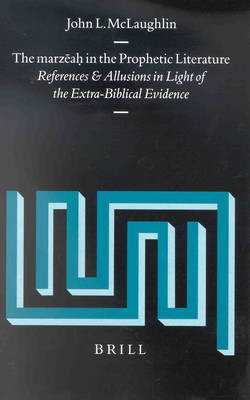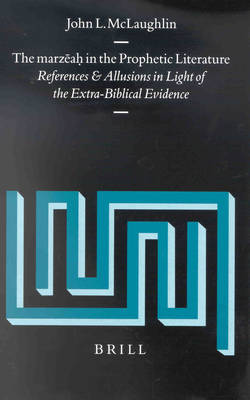
- Afhalen na 1 uur in een winkel met voorraad
- Gratis thuislevering in België vanaf € 30
- Ruim aanbod met 7 miljoen producten
- Afhalen na 1 uur in een winkel met voorraad
- Gratis thuislevering in België vanaf € 30
- Ruim aanbod met 7 miljoen producten
The Marzēaḥ In the Prophetic Literature
References and Allusions in Light of the Extra-Biblical Evidence
John McLaughlin
€ 296,45
+ 592 punten
Omschrijving
The marzēaḥ existed for 3000 years in the Semitic world, but is only mentioned in the First Testament at Amos 6:7 and Jer 16:5. Other prophetic texts have been proposed as allusions that do not use the term, but without using any consistent criteria. This study analyzes those allusions in light of the extra-biblical references.
The extra-biblical marzēaḥ references indicate three consistent features: upper-class drinking within a religious context. These elements provide the minimum criteria for evaluating possible allusions in the books of Amos, Hosea, Isaiah and Ezekiel, plus the direct references at Amos 6:7 and Jeremiah 16:5.
Combining all known references with the biblical allusions provides a single point of reference for future work on the marzēaḥ. This volume will be of special value to those interested in ancient Semitic religion.
The extra-biblical marzēaḥ references indicate three consistent features: upper-class drinking within a religious context. These elements provide the minimum criteria for evaluating possible allusions in the books of Amos, Hosea, Isaiah and Ezekiel, plus the direct references at Amos 6:7 and Jeremiah 16:5.
Combining all known references with the biblical allusions provides a single point of reference for future work on the marzēaḥ. This volume will be of special value to those interested in ancient Semitic religion.
Specificaties
Betrokkenen
- Auteur(s):
- Uitgeverij:
Inhoud
- Aantal bladzijden:
- 286
- Taal:
- Engels
- Reeks:
- Reeksnummer:
- nr. 86
Eigenschappen
- Productcode (EAN):
- 9789004120068
- Verschijningsdatum:
- 23/05/2001
- Uitvoering:
- Hardcover
- Formaat:
- Genaaid
- Afmetingen:
- 155 mm x 236 mm
- Gewicht:
- 653 g

Alleen bij Standaard Boekhandel
+ 592 punten op je klantenkaart van Standaard Boekhandel
Beoordelingen
We publiceren alleen reviews die voldoen aan de voorwaarden voor reviews. Bekijk onze voorwaarden voor reviews.









